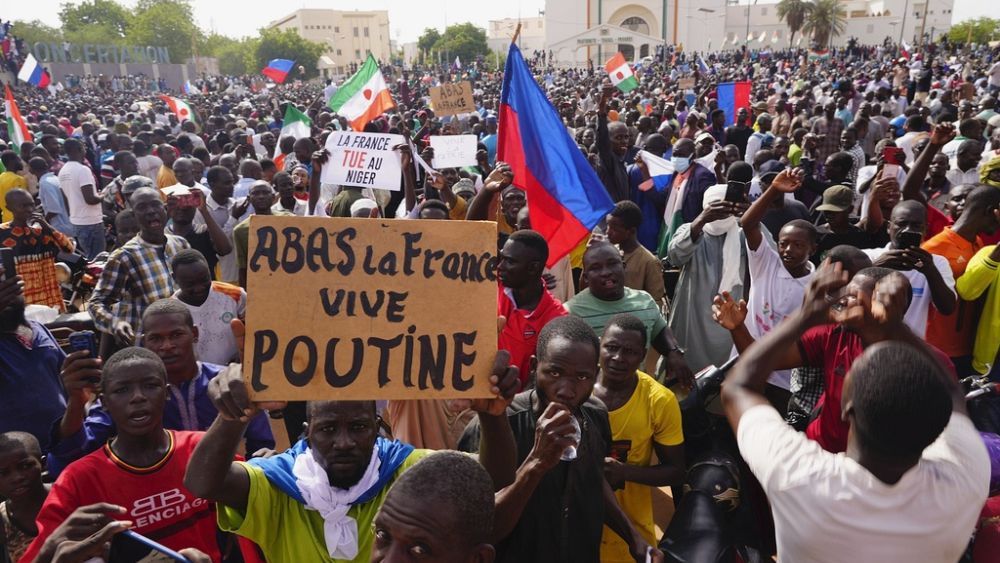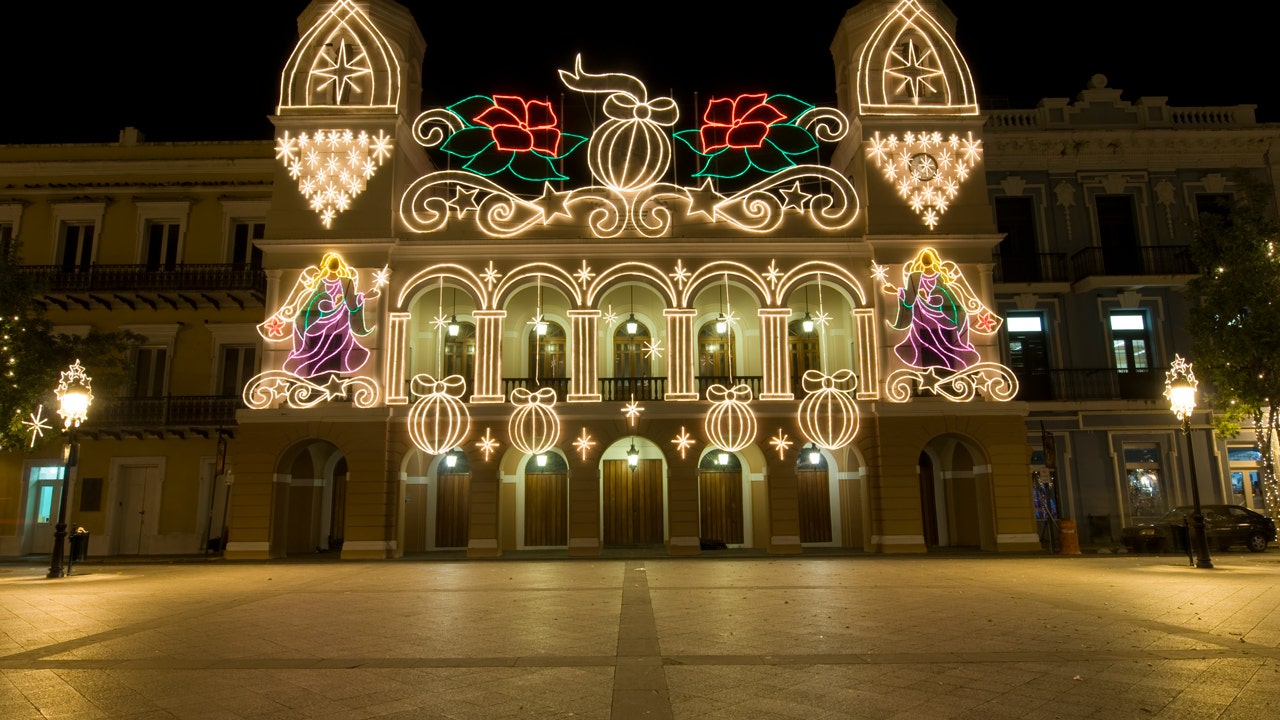World
Niger: France plans evacuation as coup leaders gather support

France, Italy and Spain have announced plans to evacuate their citizens from Niger, days after a junta seized power in the country.
This comes as two other West African nations ruled by mutinous soldiers, Mali and Burkina Faso, warned that any military intervention against the junta would be considered a “declaration of war”.
The French Foreign Ministry in Paris cited recent violence that targeted the French Embassy in Niamey, the capital, as one of the reasons for the decision.
The closure of Niger’s airspace also “leaves our compatriots unable to leave the country by their own means,” the ministry said.
The evacuation was starting Tuesday for French and European citizens who wish to leave, it said in a statement. The German Foreign Ministry has urged German citizens in Niger to board the evacuation planes offered by the French authorities.
Italian foreign minister Antonio Tajani announced on Twitter that Italy would also arrange flights to evacuate its nationals from Niger’s capital Niamey.
“The Italian government has decided to offer Italian nationals present in Niamey the possibility of leaving the city on a special flight to Italy. The Italian Embassy in Niamey will remain open and operational, also to contribute to the mediation efforts a course,” Tajani said.
Later on Tuesday, the Spanish foreign ministry confirmed it would evacuate 70 of its citizens from Niger by planes, given the absence of commercial flights. The evacuations will begin Tuesday and could be extended to other EU nationals.
The three EU countries’ decisions to evacuate come amid a deepening crisis sparked by the coup last week against Niger’s democratically elected president, Mohamed Bazoum.
A European Commission spokesperson confirmed Tuesday that EU personnel in Niger’s capital Niamey have been offered support to leave the city voluntarily, but that no decision on formally evacuating EU staff has yet been taken.
“The safety of EU citizens in Niger is our top priority,” the spokesperson said.
The West African regional body known as ECOWAS announced travel and economic sanctions against Niger on Sunday and said it would use force if the coup leaders don’t reinstate Bazoum within one week. Bazoum’s government was one of the West’s last democratic partners against West African extremists.
The European Commission confirmed that it had not yet received a request from ECOWAS to support travel and economic sanctions, but that it will analyse any request carefully, “with the purpose of determining of how best to respect the political commitments we have made.”
In a joint statement, the military governments of Mali and Burkina Faso said that “any military intervention against Niger will be considered as a declaration of war against Burkina Faso and Mali.”
Col. Abdoulaye Maiga, Mali’s state minister for territorial administration and decentralization, read the statement on Malian state TV Monday evening. The two countries also denounced the ECOWAS economic sanctions as “illegal, illegitimate and inhumane” and refused to apply them.
ECOWAS suspended all commercial and financial transactions between its member states and Niger, as well as freezing Nigerien assets held in regional central banks. Niger relies heavily on foreign aid, and sanctions could further impoverish its more than 25 million people.
Mali and Burkina Faso have each undergone two coups since 2020, as soldiers overthrew governments claiming they could do a better job fighting increasing jihadi violence linked to al-Qaida and the Islamic State group. ECOWAS has sanctioned both countries and suspended them from the bloc, but never threatened to use force.
Also on Sunday, Guinea, another country under military rule since 2021, issued a statement in support of Niger’s junta and urged ECOWAS to “come to its senses.”Two West African nations ruled by mutinous soldiers said Monday that military intervention in Niger would be considered a “declaration of war” against them, as the junta attempts to consolidate power after a coup last week.
In anticipation of the ECOWAS decision Sunday, thousands of pro-junta supporters took to the streets in Niamey, denouncing France, waving Russian flags along with signs reading “Down with France” and supporting Russian President Vladimir Putin and telling the international community to stay away.
There has been no clear explanation of the Russian symbols, but the country seems to have become a symbol of anti-Western feelings for demonstrators.
Protesters also burned down a door and smashed windows at the French Embassy before the Nigerien army dispersed them.
Niger could be following in the same footsteps as Mali and Burkina Faso, say analysts, both of which saw protestors waving Russian flags after their respective coups. After the second coup in Burkina Faso in September, protestors also attacked the French Embassy in the capital, Ouagadougou, and damaged and ransacked the Institut Francais, France’s international cultural promotion organization.
If ECOWAS uses force, it could also trigger violence between civilians supporting the coup and those against it, Niger analysts say.
While unlikely, “the consequences on civilians of such an approach, if putschists chose confrontation, would be catastrophic,” said Rida Lyammouri, a senior fellow at the Policy Center for the New South, a Morocco-based think tank.
Lyammouri does not see a “military intervention happening because of the violence that could trigger,” he said.
Blinken on Sunday commended the resolve of the ECOWAS leadership to “defend constitutional order in Niger” after the sanctions announcement and joined the bloc in calling for the immediate release of Bazoum and his family.
Also Sunday, junta spokesman Col. Maj. Amadou Abdramane banned the use of social media to put out messages he describe as harmful to state security. He also claimed without evidence that Bazoum’s government had authorized the French to carry out strikes to free Bazoum.
Observers believe Bazoum is being held at his house in the capital, Niamey. The first photos of him since the coup appeared Sunday evening, sitting on a couch smiling beside Chad’s President Mahamat Deby, who had flown in to mediate between the government and the junta.
Working with the West against extremism
Both the United States and France have sent troops and hundreds of millions of dollars of military and humanitarian aid in recent years to Niger, which was a French colony until 1960. The country was seen as the last working with the West against extremism in a Francophone region where anti-French sentiment had opened the way for the Russian private military group Wagner.
After neighbouring Mali and Burkina Faso ousted the French military and began working with Wagner mercenaries, US Secretary of State Antony Blinken visited Niger in March to strengthen ties and announce $150 million in direct assistance, calling the country “a model of democracy.”
The US will consider cutting aid if the coup is successful, the State Department said Monday. Aid is “very much in the balance depending on the outcome of the actions in the country,” said department spokesman Matt Miller. “US assistance hinges on continued democratic governance in Niger.”
France said Monday that President Emmanuel Macron is closely monitoring the situation in Niger and has discussed the crisis with regional leaders and European and international partners.
The sanctions could be disastrous and Niger needs to find a solution to avoid them, Prime Minister Ouhoumoudou Mahamadou told French media outlet Radio France Internationale on Sunday.
“When people say there’s an embargo, land borders are closed, air borders are closed, it’s extremely difficult for people … Niger is a country that relies heavily on the international community,” he said.
In the capital of Niger, many people live in makeshift shelters tied together with slats of wood, sheets and plastic tarps because they can’t pay rent. They scramble daily to make enough money to feed their children.
ECOWAS mixed record
Since the 1990s, the 15-nation ECOWAS has tried to protect democracies against the threat of coups, with mixed success.
Four nations are run by military governments in West and Central Africa, where there have been nine successful or attempted coups since 2020.
In the 1990s, ECOWAS intervened in Liberia during its civil war, one of the bloodiest conflicts in Africa and one that left many wary of intervening in internal conflicts. In 2017, ECOWAS intervened in Gambia to prevent the new president’s predecessor, Yahya Jammeh, from disrupting the handover of power. Around 7,000 troops from Ghana, Nigeria, and Senegal entered the country, according to the Global Observatory, which provides analysis of peace and security issues. The intervention was largely seen as accomplishing its mission.

World
Italian state railways plans 1.3 bln euro investment in solar plant

World
Christmas in Puerto Rico is a 45-day celebration with caroling, festive decorations, family feasts and more

Christmas, Navidad in Puerto Rico, extends far beyond Dec. 25.
The island proudly proclaims itself as having the “longest holiday season in the world,” according to the website Discover Puerto Rico.
On average, the holiday festivities in Puerto Rico last about 45 days, per the source, commencing right after Thanksgiving, and stretching all the way through mid-January.
The Christmas season in Puerto Rico typically lasts around 45 days. (iStock)
HOW TO SAY ‘MERRY CHRISTMAS’ IN 10 LANGUAGES TO FRIENDS AROUND THE WORLD
The holiday season in Puerto Rico is full of rich traditions beloved by families.
One tradition those who visit Puerto Rico will immediately notice during the holiday season is decorations.
In Puerto Rico, decorations are typically put up by Thanksgiving, and kept up until the season concludes in mid-January, with opportune picture moments at every corner.
Parrandas, Christmas caroling, is a holiday staple.
17 SECRET TRAVEL TIPS FOR FALL AND WINTER THAT AREN’T SO SECRET AFTER ALL
Carolers choose houses of family and friends to visit, typically starting around 10 p.m., performing aguinaldos (traditional Christmas songs), with not only their voices, but often with instruments as well, according to Discover Puerto Rico.
The group you begin caroling with is likely not the same group you end with.
In Puerto Rico, when carolers visit a house, they’ll often stop inside for conversation, food and drink before moving to the next residence.

Coquito is a popular beverage enjoyed during the holiday season in Puerto Rico. Coconut, vanilla and rum are among the ingredients. (Mayra Beltran/Houston Chronicle via Getty Images)
Usually, the residences of the house visited will join the group for the next house, according to Discover Puerto Rico.
CHRISTMAS TREES IN GERMANY WERE DECORATED WITH APPLES INSTEAD OF ORNAMENTS IN THE 1600S FOR ‘ADAM AND EVE DAY’
A night of serenading loved ones can last quite a while, often stretching into the early morning hours of the following day, according to the source.
The biggest day of the holiday season in Puerto Rico actually isn’t Christmas, but instead, the night before.
In Puerto Rico, Dec. 24 is Nochebuena. On that day, loved ones gather for the exchange of gifts, caroling and a large feast.
Many families will also attend a midnight Mass on the day, known as Misa de Gallo.
FLIGHT ATTENDANTS REVEAL THE SURPRISING DAY TO TRAVEL AHEAD OF THE CHRISTMAS RUSH
After Christmas passes, the festivities go on in Puerto Rico.
Another big event in the holiday lineup is Three Kings Day on Jan. 6, a holiday that “commemorates the visit that the Three Wise Men paid to Jesus after his birth,” according to Discover Puerto Rico.
On the eve of the day, children fill up a shoebox with grass to be left for camels to munch on while the Three Kings leave behind gifts for them, according to PuertoRico.com.
For a particularly festive Three Kings Day, Juana Díaz is the place to go, as it hosts the largest celebration in Puerto Rico for the holiday. In Juana Díaz, there is an annual festival and parade in honor of Three Kings Day that brings together over 25,000 people every year, according to Discover Puerto Rico.

Gifts are primarily exchanged between loved ones on Christmas Eve in Puerto Rico. (iStock)
Then, eight days later is Octavitas, a post-holiday celebration where families get together and celebrate one last time for the season.
The end of the holiday season is marked with the San Sebastián Street Festival.
This festival, spanning over multiple days, takes place in Old San Juan, and is filled with live music, dancing, shopping and parades.
World
Small plane crashes into Brazil town popular with tourists, killing 10

Twin-engine plane crashed in largely residential neighborhood of Gramado shortly after takeoff, authorities say.
A small plane has crashed into a tourist hotspot in southern Brazil, killing all 10 people on board and injuring more than a dozen people on the ground, officials have said.
The twin-engine Piper PA-42-1000 hit the chimney of a home and the second floor of a different house before crashing into a shop in a largely residential neighbourhood of Gramado shortly after takeoff from Canela, Brazil’s Civil Defense agency said on Sunday.
Rio Grande do Sul Governor Eduardo Leite told a news conference that the aircraft’s owner and pilot, Luiz Claudio Galeazzi, was killed along with nine members of his family.
Leite said that 17 people on the ground were injured, 12 of whom were still receiving treatment in hospital.
Galeazzi’s company, Galeazzi & Associados, confirmed that its CEO and Galeazzi’s wife and three daughters had died in the crash.
“Luiz Galeazzi will be forever remembered for his dedication to his family and for his remarkable career as a leader of Galeazzi & Associados,” the company said in a post on LinkedIn.
“In this moment of immense pain, Galeazzi & Associados is deeply grateful for the expressions of solidarity and affection received from friends, colleagues and the community. We also sympathize with all those affected by the accident in the region.”
Gramado, located in the Serra Gaucha mountains, is a popular destination for vacationers, especially during the Christmas season.
The crash comes a little more than a year after Brazil suffered its worst air disaster in nearly two decades when a twin-engine plane crashed in the southeastern city of Vinhedo, killing all 62 people on board.
-

 Politics1 week ago
Politics1 week agoCanadian premier threatens to cut off energy imports to US if Trump imposes tariff on country
-
/cdn.vox-cdn.com/uploads/chorus_asset/file/25789444/1258459915.jpg)
/cdn.vox-cdn.com/uploads/chorus_asset/file/25789444/1258459915.jpg) Technology1 week ago
Technology1 week agoOpenAI cofounder Ilya Sutskever says the way AI is built is about to change
-

 Politics1 week ago
Politics1 week agoU.S. Supreme Court will decide if oil industry may sue to block California's zero-emissions goal
-
/cdn.vox-cdn.com/uploads/chorus_asset/file/25546252/STK169_Mark_Zuckerburg_CVIRGINIA_D.jpg)
/cdn.vox-cdn.com/uploads/chorus_asset/file/25546252/STK169_Mark_Zuckerburg_CVIRGINIA_D.jpg) Technology1 week ago
Technology1 week agoMeta asks the US government to block OpenAI’s switch to a for-profit
-

 Business1 week ago
Business1 week agoFreddie Freeman's World Series walk-off grand slam baseball sells at auction for $1.56 million
-
/cdn.vox-cdn.com/uploads/chorus_asset/file/23951353/STK043_VRG_Illo_N_Barclay_3_Meta.jpg)
/cdn.vox-cdn.com/uploads/chorus_asset/file/23951353/STK043_VRG_Illo_N_Barclay_3_Meta.jpg) Technology1 week ago
Technology1 week agoMeta’s Instagram boss: who posted something matters more in the AI age
-
News1 week ago
East’s wintry mix could make travel dicey. And yes, that was a tornado in Calif.
-
/cdn.vox-cdn.com/uploads/chorus_asset/file/24924653/236780_Google_AntiTrust_Trial_Custom_Art_CVirginia__0003_1.png)
/cdn.vox-cdn.com/uploads/chorus_asset/file/24924653/236780_Google_AntiTrust_Trial_Custom_Art_CVirginia__0003_1.png) Technology2 days ago
Technology2 days agoGoogle’s counteroffer to the government trying to break it up is unbundling Android apps

















